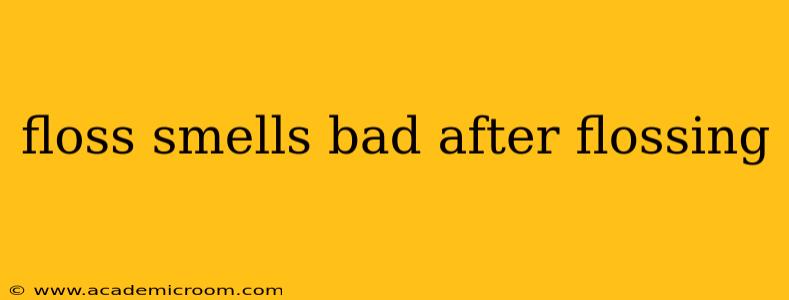Many people diligently floss daily, only to be met with an unpleasant surprise: a foul odor emanating from their floss after use. This isn't just an inconvenience; it's a signal that something isn't right with your oral hygiene. This comprehensive guide will explore the reasons why your floss might smell bad after flossing, and offer solutions to improve your oral health and banish those bad smells for good.
What Causes Bad-Smelling Floss?
The unpleasant odor on your floss after flossing is often a result of bacteria and food particles trapped between your teeth. This buildup is a breeding ground for harmful bacteria that produce volatile sulfur compounds (VSCs), the primary culprits behind bad breath (halitosis). These compounds are responsible for the rotten egg smell often associated with poor oral hygiene.
Why Does My Floss Smell Bad Even Though I Brush Regularly?
This is a common question, and it highlights a crucial point: brushing alone isn't sufficient for complete oral hygiene. While brushing removes plaque and food particles from the surfaces of your teeth, it doesn't reach the tight spaces between your teeth where food debris and bacteria can accumulate. Flossing is essential to remove this interdental plaque, and if your floss smells bad even after brushing, it suggests that this interdental cleaning is crucial and you might need to improve your flossing technique.
How Can I Prevent My Floss From Smelling Bad?
The key to preventing bad-smelling floss lies in improving your overall oral hygiene routine and addressing the underlying causes of bacterial buildup. Here's a breakdown of effective strategies:
1. Proper Flossing Technique:
Using the correct flossing technique is paramount. Don't just snap the floss between your teeth; gently curve it around each tooth in a "C" shape, reaching below the gumline to dislodge food particles and plaque. Use a fresh section of floss for each tooth to avoid reintroducing bacteria.
2. Consistent and Thorough Flossing:
Regular flossing is crucial. Aim to floss at least once a day, ideally before brushing to effectively remove trapped debris before brushing.
3. Choosing the Right Floss:
Experiment with different types of floss to find one that suits your needs. Waxed floss can slide more easily between tight teeth, while unwaxed floss may be more effective at removing plaque. Consider floss picks for easier handling, particularly for those with dexterity issues.
4. Addressing Underlying Dental Issues:
Bad-smelling floss could indicate underlying dental problems like gingivitis (gum inflammation), periodontitis (gum disease), or cavities. Regular dental checkups are crucial for early detection and treatment.
5. Maintaining a Healthy Diet:
A diet high in sugary and processed foods contributes to bacterial growth. Opt for a balanced diet rich in fruits, vegetables, and whole grains to support oral health.
6. Staying Hydrated:
Drinking plenty of water helps wash away food particles and bacteria, contributing to fresher breath and cleaner floss.
Is Bad-Smelling Floss a Sign of Gum Disease?
Yes, persistently bad-smelling floss could be a sign of gum disease. Gum disease is characterized by inflammation and infection of the gums, leading to increased bacterial buildup and potentially foul-smelling breath and floss. If you notice persistent bad breath, bleeding gums, or swollen gums alongside bad-smelling floss, consult your dentist immediately.
What Should I Do If My Floss Still Smells Bad After Trying These Tips?
If you've implemented these suggestions and your floss still smells bad, it's essential to schedule an appointment with your dentist. They can properly assess your oral health, diagnose any underlying issues, and recommend appropriate treatment. This could involve professional cleaning, gum disease treatment, or other necessary interventions.
By following these guidelines, you can significantly improve your oral hygiene, banish bad-smelling floss, and maintain a healthy, fresh-smelling mouth. Remember, consistent effort and attention to detail are key to achieving optimal oral health.
